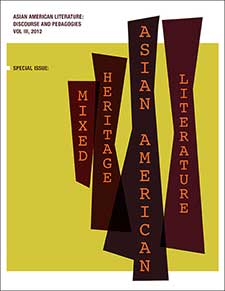Writing Mixed Race Asian Americans into the Nation: Narratives of National Incorporation in the Bildungsroman and the Multiracial Movement
Wesleyan University
May 2013
80 pages
May Lee Watase
A thesis submitted to the faculty of Wesleyan University in partial fulfillment of the requirements for the Degree of Bachelor of Arts with Departmental Honors in American Studies
Introduction
In spring 2011, during my sophomore year at Wesleyan, the student group I was a member of, MIX (an acronym for mixed heritage, interracial, cross-cultural), invited Ken Tanabe, a multiracial graphic designer and social activist to host a Loving Day celebration on Wesleyan’s campus. Tanabe is the founder of Loving Day, an event that celebrates interracial love, multiethnic identity, and marks the 1967 anniversary of the Loving v. Virginia case that legalized interracial marriage. At our own event, Tanabe and a few other representatives of the Loving Day organization gave us Loving Day buttons, showed us a power point presentation, and chatted with us about our mixed race identities. At the end of the hour, Tanabe asked to take a picture of the group, snapping the exact moment the ten of us jumped in the air. About a month ago, two years following our celebration with Tanabe, I opened an email from the Loving Day listserv to find the following:
The Loving Day Project is pleased to announce the launch of Loving Day ON CAMPUS… a resource guide and forum to help students across the country connect, share, and inspire…Students have celebrated this important civil rights milestone in a variety of ways…We want every student and organization to have the best events possible, so we have created the Loving Day ON CAMPUS facebook page.
I clicked the link and found the picture of the Wesleyan MIX group on the Facebook page—there we all were, happy and smiling as the unofficial faces of Loving Day ON CAMPUS. I was slightly surprised to see myself there and began scrolling through the rest of the Loving Day website, becoming increasingly aware of the fact that Loving Day’s marketing strategy relied heavily on a celebratory “mixed-race” look…
In this thesis, I examine the relationship between the multiracial movement, the genre of the bildungsroman, or “coming of age novel,” and mixed race Asian American novels that are contextualized in the decade of the 1990s. The three novels I use in this study are Paper Bullets: a Fictional Autobiography, by Kip Fulbeck (2001); American Son: A Novel, by Brian Ascalon Roley (2001); and My Year of Meats, by Ruth Ozeki (1998). I situate each novel within the rhetoric of the multiracial movement of the 1990s, which forwarded the institutionalization and legitimization of mixed race identity in American society both legally and socially, in the government, in education, and in popular culture. Each novel employs different functions of the bildungsroman, narrating the protagonists’ complex relationships with the boundaries of the nation, grappling with the notion of national belonging and validation. The bildungsroman structure and the multiracial movement both construct a progressive, teleological discourse, narrating a trajectory from exclusion and marginality to an endpoint of inclusion within the nation as a celebratory affirmation of identity. By focusing on the ways in which these three mixed race Asian American texts subvert, manipulate, or are confined by the form of the bildungsroman and the rhetoric of the multiracial movement, I examine the pathways to inclusion in the American body politic and the positionality of the mixed race Asian American subject within and beyond the boundaries of the America. My studies of each text draw from contentious moments in the United States in the 1990s: the rhetoric of Ethnic Studies and cultural nationalism, the Rodney King beating and L.A. Riots, and the ascendancy of Asian economic power—all discourses that intervene in the narrative progress of the mixed race Asian American subject in American public discourse…
Read the entire thesis here.


